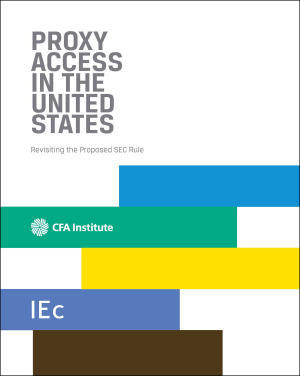Proxy Access: Vital to Address Current Market Failure, or Are There Other Ways to Make Boards Accountable?
Proxy access allows investors to nominate directors directly on company proxy statements in certain circumstances, a right that shareowners have in most developed markets — but not in the United States. It’s been a hotly debated topic since the SEC’s 2010 proxy access rule proposal was challenged in court and ultimately struck down by the DC Circuit Court of Appeals over cost-benefit concerns.
A new study sponsored by CFA Institute concludes that positive investor reactions to the SEC’s 2010 proxy access rule proposal provides a powerful response to the court’s cost-benefit concerns. The reactions, registered both before and after the court’s decision to discard the rule, suggest it might be time for the SEC to again allow investors to nominate directors directly on company proxy statements in certain circumstances.
To help further the debate, CFA Institute partnered this week with CFA Society Washington, DC, and the University of Maryland’s Center for Financial Policy at the Robert H. Smith School of Business to host a panel of experts to discuss the report Proxy Access in the United States: Revisiting the Proposed SEC Rule.
Pictured left to right: Matt Orsagh, CFA, CIPM, director of capital markets policy at CFA Institute, and Jim Allen, CFA, head of Americas capital markets policy at CFA Institute, discuss new proxy access research at an event featuring representatives from BlackRock, the US Chamber of Commerce, and Institutional Shareholder Services.
The event began with a review of the paper’s findings:
- The CFA Institute research shows it is unlikely that special interest groups could hijack boards through the use of proxy access because of high ownership thresholds to use the rule and the need to garner 50% shareowner support for nominees.
- The results of existing event studies suggest that proxy access has the potential to enhance board performance and raise overall US market capitalization.
- None of the event studies indicates proxy access reform would hinder board performance.
- Proxy access is used infrequently around the world, suggesting that proxy access has not disrupted the election process in jurisdictions that allow it.
- Proxy access is likely to drive more engagement between issuers and investors.
The panel was moderated by Steve Wallenstein, professor of the practice of finance at the Smith School of Business. Panelists included Zach Oleksiuk, CFA, head of corporate governance for the Americas at BlackRock, David Hirschmann, CEO of the US Chamber of Commerce Center for Capital Market Competitiveness, Kathleen Hanley, visiting professor at the Smith School of Business, and Sean Quinn, executive director of Institutional Shareholder Services. The panel discussed the issue of proxy access and whether access to the corporate proxy addresses a current market failure, or whether there are other ways to ensure board accountability. It was clear that investors consider access to the corporate proxy a fundamental right to keep boards accountable to shareowners, while business groups tend to highlight concerns that proxy access could be used to hijack corporate boards and that there may be better ways to align the interests of boards and shareowners.
Both sides agreed that the recent trend in increased engagement between shareowners and issuers is a positive development. Nevertheless, some disagreed as to whether a proxy access rule would spur more fruitful engagement.
The panel discussed the increase in “private ordering” around proxy access — that is individual shareowner proposals asking for proxy access at a few dozen US companies. The proposals that have earned the support of the most investors mirror the ownership requirements placed in the proposed 2010 SEC rule — 3% ownership for at least three years, limiting nominees to only 25% of the board. During the Q&A portion of the session it was clear that many institutional investors would prefer proxy access at all companies, but for the time being, are proceeding with proposals at individual companies because that is the only recourse currently available to them. These efforts around private ordering received a boost recently by the New York City Comptroller’s “Board Accountability Project” in which the comptroller’s office plans to submit proxy access proposals at 75 companies in the coming 2015 proxy season.
It also became clear during the discussion that since the Court of Appeals decision in 2011, the SEC has indicated that it has introduced a more robust cost-benefit analysis process that does a better job of integrating economic analysis into rule making.
Unfortunately for supporters, the SEC did not cite proxy access as a top priority in the Commission’s strategic plan for FY14. However, the new CFA Institute report, combined with recent efforts by investors to push for proxy access at US companies, once again has brought the issue to the attention of the investor, issuer, and regulatory communities.
If you liked this post, consider subscribing to Market Integrity Insights.
Photo credit: Leslie E. Kossoff/LK Photos



With CFA’s report and NYC’s plan to submit proxy access proposals at 75 companies, we have the makings of the next wave. Like majority vote requirements, most of the S&P 500 will be adopting meaningful proxy access in the next 5 years — with or without the SEC.
Thanks Jim. The issue of proxy access will certainly keep proxy season interesting. We, like everyone else, will keep a close eye on how voting on the issue goes in the spring.